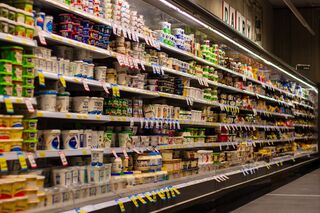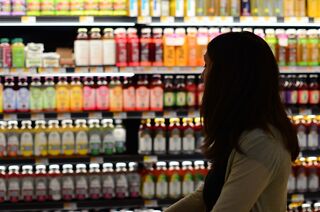Eating Disorders
Nobody Knows What “Clean Eating” Means
New research warns of misleading and potentially harmful "clean” food labels.
Posted September 2, 2021 Reviewed by Gary Drevitch
Key points
- New research shows that there is no standard definition for “clean eating," nor any legal guidance on when “clean” labels can be used.
- Many consumers use a “clean” food label as a shortcut to determine that a food is healthy, even when it is not.
- Tagging food with emotion-laden terms like “clean” can be psychologically damaging to those vulnerable to disordered eating.

You don’t have to wander far in a supermarket to encounter a food labeled as “clean.” Likewise, a quick scroll through social media reveals how trendy it is for people to claim they are “eating clean.” But new research led by authors from Boston Children’s Hospital and Harvard’s School of Public Health emphasizes that there is no standard definition for “clean eating.” Further, labeling certain foods as clean can be misleading to consumers and may reinforce eating disordered behaviors.
A major problem with “clean” labels on foods is that there is no agreement on what “clean” means in this context. For some, “clean” refers to food that is minimally processed, like whole grains and fresh fruits and vegetables. Others assume “clean” food meets more specific criteria, like being gluten-free or vegan. Finally, some use the term “clean” to refer to foods that are free of chemical-sounding additives (even if those additives are harmless), or foods that are low in salt or sugar. A variety of “clean food” labels can be found on the shelves of grocery stores, despite the fact that there is no industry-accepted definition for “clean food.”

In this new research, published in the International Journal of Eating Disorders, the authors conducted what’s called a “scoping review.” This method involves systematically searching for and reviewing published evidence related to a broad question or topic. In this case, the authors focused on regulations or official guidance related to the use of “clean” as a food label. They conducted a review of FDA enforcement documents (often referred to as “warning letters”), as well as legal documents and publications that address the regulation of food in the U.S.
The authors found that the FDA provides no definition of “clean,” nor is there any current legal guidance on when “clean” labels can be used. That means pretty much any food producer can call their product “clean” for any reason at all. The researchers expressed concern about this lack of official guidance for several reasons.
"Clean" food is not always healthy
First, many consumers use a “clean” food label as a shortcut to determine that a food is healthy. But as the authors of this new paper note, in many cases, foods labeled “clean” are not particularly healthy. In fact, foods bearing some type of “clean” label often include high levels of salt, saturated fat, and refined carbohydrates.
One creative research study compared the content of online recipes labeled as “clean” to recipes for the same dish without “clean” labels. For example, the authors examined a popular recipe for chocolate cheesecake described as “clean” and compare it to a standard recipe for chocolate cheesecake. Overall, the researchers found that these two categories of recipes ("clean" and standard) were virtually indistinguishable in terms of caloric content, salt, and sugar. Further, they had similar nutritional profiles.

Misleading claims
A related reason to question “clean eating” labels is that foods purporting to be “clean” are often promoted as having health benefits they simply do not have. The authors of this review point to supposedly “clean” food products that advertise health effects ranging from “muscle gain and fat loss” to “cleansing, energy, and rejuvenation” to the ability to cure cancer. Not surprisingly, these claims are not backed by scientific data. Misleading individuals about the health benefits of foods could make consumers less likely to seek scientifically-grounded medical care when they need it. At a more basic level, the false promises of “clean” labeled food products prevent consumers from obtaining accurate information about the foods they eat and can lead shoppers to pay for more expensive versions of products that offer no additional health benefits.
Negative psychological outcomes
The researchers also describe negative psychological outcomes related to the use of terms like “clean eating.” Calling food “clean” introduces a moral element to eating. After all, if some foods can be “clean,” that implies other foods are dirty. Thinking about food in moral terms is associated with eating disordered behaviors. The term “orthorexia” has emerged to refer to an eating disorder that looks like anorexia but is driven by supposed concern over the health or purity of food rather than a drive for weight loss. But researchers have found that those with orthorexic tendencies tend to be much more driven by weight loss concerns than concerns over health. In other words, some who say they’re “eating clean” may be attempting to mask a worrisome level of dietary restriction, the kind we associate with eating disorders.
Lack of official guidance
The FTC and FDA already prohibit false or misleading claims on food labels, as well as deceptive acts or practices related to food advertising. But perhaps because the word “clean” as a descriptor of foods is relatively new, these agencies provide no official guidance around the use of the term. The authors of this new research recommend that the FDA provide industry guidance regarding “clean” labels, as well as a public statement about the propensity for these labels to be highly misleading to consumers. Based on their review, they suggest that the FDA should send warning letters when food labels or advertisements make “clean food” claims that could have negative health consequences for consumers, like saying a food can cure cancer or prompt weight loss.
In some cases, consumers have taken concerns about the misuse of these types of food labels into their own hands. For example, the popular restaurant chain Panera has been sued for false and deceptive marketing for the “100% clean” label that recently appeared on their menu.
The take-home message is that consumers should be skeptical of labels that promise “clean” food. There is no standard, legal definition of the label, and many products that carry it appear to advance misleading claims. Beyond that, tagging food with emotion-laden terms like “clean” (which implies other foods are “dirty”) is a merging of morality and eating that is psychologically unhealthy, particularly for those with vulnerability to disordered eating.




